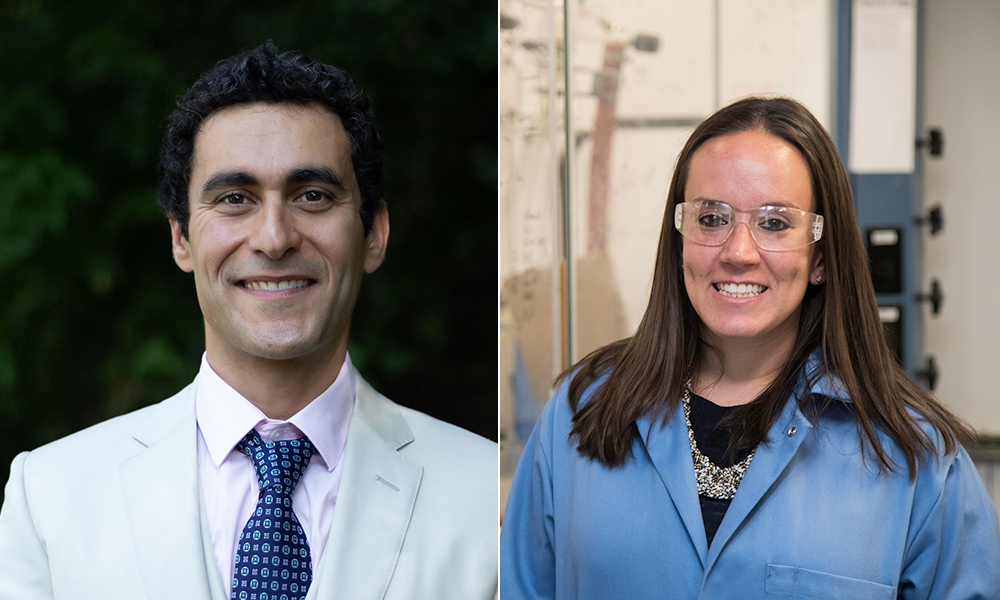Two University of Rochester faculty members–Hussein Aluie and Ellen Matson–have been named recipients of Early Career Research awards from the Department of Energy (DOE). The award, now in its tenth year, is designed to bolster the nation’s scientific workforce by providing support to exceptional researchers during the crucial early career years, when many scientists do their most formative work.
Matson and Aluie are among 73 scientists–including 27 from DOE’s national laboratories and 46 from US universities–to receive the award from DOE’s Office of Science this year. For university faculty members, the awards pay $150,000 a year for five years.
Aluie, an assistant professor of mechanical engineering, will pursue a new method his group has been developing to advance numerical modeling of the incredibly complex fluid instabilities that hinder achieving controlled nuclear fusion in the lab. A self-sustaining fusion reaction could provide a virtually endless supply of clean energy.
When lasers converge on the exterior of a deuterium/tritium fuel capsule during an inertial confinement fusion experiment at the Laboratory for Laser Energetics, the lasers turn the outer shell into a hot, low-density plasma. This plasma pushes against the colder, denser shell inside. Different materials start inter-penetrating through each other, like fingers, removing heat from the center and bringing in impurities from the outside. The target’s core fails to reach sufficiently high temperatures and densities. Numerical models that attempt to predict these fluid instabilities fall short because they fail to sufficiently resolve the vorticity, or local spinning, at various locations within the plasma and are unlikely to be resolved in the near future due to exorbitant computing costs.
Aluie seeks to address this challenge by developing a nonlinear mixing model capable of accounting for the missing vorticity. The research plan includes extensive development, testing, and validation. “The project should enable HED [high-energy density] application codes, such as those used in fusion, to better predict instability growth and mixing at a significantly lower computational cost,” Aluie says. The project may also prove valuable beyond HED applications, such as in astrophysics, he says.
Aluie, who joined the University in 2014, was awarded 137 million hours of access to Argonne National Laboratory’s MIRA supercomputer to conduct simulations of the fluid instabilities that occur during inertial confinement fusion experiments. In 2017 he was chosen as a University of Rochester Wilmot Assistant Professor. The award recognizes “some of the most promising young men and women in the early stages of their academic careers.”
Matson, an assistant professor of chemistry, will use her award to expand her research program into heavy element chemistry. In particular, the laboratory will begin investigating the electronic communication between four electron-rich actinide elements–thorium, uranium, neptunium and plutonium–and metal-oxide clusters.
The emphasis of this work rests in understanding the way these elements engage in sharing electrons with electron-poor metal-oxide assemblies. This could lead to new reactivity pathways for these radioactive atoms, and also new applications in separations chemistry. In particular, her work could lead to the development of well-defined, chemical uses for the long-lived radionuclides of the nuclear fuel cycle – including both the products of front-end enrichment processes and the back-end spent fuels.
Funding through the Department of Energy’s prestigious Early Career program allows Matson to return to her scientific roots. Matson obtained her PhD in chemistry studying the synthesis, reactivity and electronic structure of electron-rich, uranium-carbon bonds. These new projects will merge Matson’s interests in multimetallic assemblies with her love of the actinide elements.
Matson’s previous awards include a Sloan Fellowship, a National Science Foundation CAREER award; the Edith Flanigen award from Humboldt University of Berlin, the Course Hero-Woodrow Wilson Fellowship for Excellence in Teaching; and a University Furth Fund award, given to foster the development of promising scientists in the natural and biological sciences. She has also been chosen as a Cottrell Scholar by the Research Corporation for Science Advancement,
To be eligible for the DOE award, a researcher must be an untenured, tenure-track assistant or associate professor at a US academic institution or a full-time employee at a DOE national laboratory, who received a PhD within the past 10 years. Research topics are required to fall within one of the Department’s Office of Science’s six major program offices: Advanced Scientific Computing Research, Basic Energy Sciences, Biological and Environmental Research, Fusion Energy Sciences, High Energy Physics, and Nuclear Physics.
Awardees were selected from a large pool of university- and national laboratory-based applicants. Selection was based on peer review by outside scientific experts. Projects announced today are selections for negotiation of financial award. The final details for each project award are subject to final grant and contract negotiations between DOE and the awardees.




